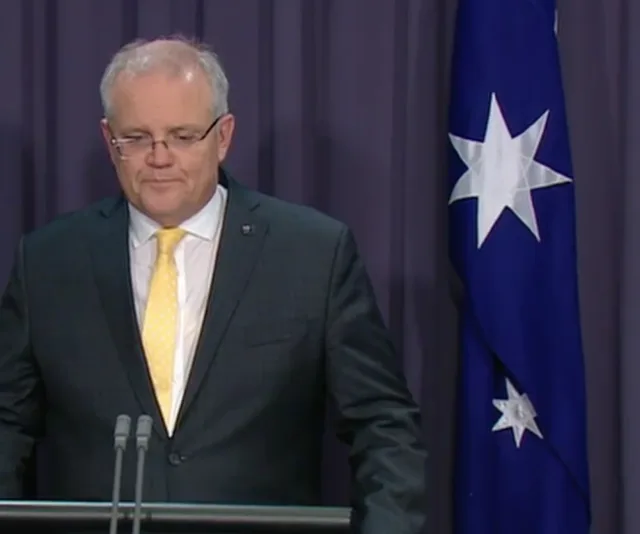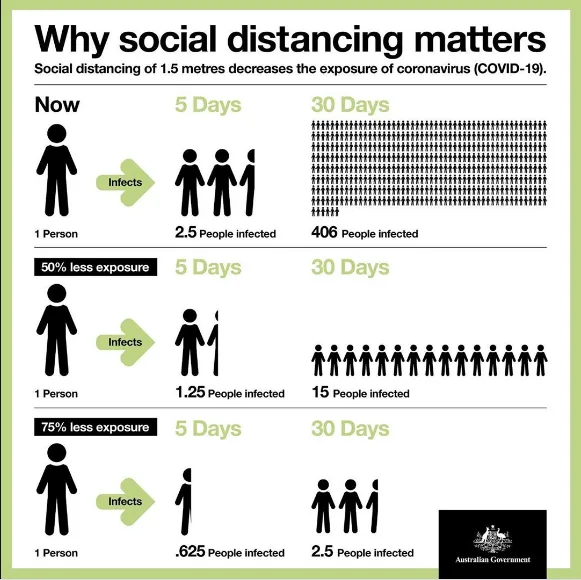As our Prime Minister Scott Morrison continues to unveil a wide range of changes to everyday life in an effort to halt the rapid spread of the coronavirus, Australians have found themselves adjusting to a new normal.
“Life is going to continue to change as we deal with the global coronavirus,” the PM said during a press conference in early March.
“This is a once-in-100-years type of event. We haven’t seen this sort of thing in Australia since the Second World War. But we are up to to this challenge. We’re all able to deal with this.”
Mr Morrison said the changes implemented needed to be “scalable and sustainable”, as Australians could be facing the impacts of the crisis for at least six months, if not longer.
“We are going to keep Australia running and we are going to keep Australia functioning. It won’t look like it normally does, but it is important that we continue to put in place measures that are scalable and sustainable.
“There is no two-week answer to what we are confronting. The idea that you can just turn everything off for two weeks and turn it back on again, that is not our way through this. Our measures need to be scalable and they need to be sustainable.”
With new rules being implemented everyday, we’ll keep updating this page so you can stay across the most recent announcements.
Keep on scrolling to find out everything you need to know about social distancing, travel, schools and work.

The PM Scott Morrison is now giving multiple press conferences a week, updating Australians on the coronavirus pandemic.
(Image: ABC)Gatherings restricted to just two people
Indoor gatherings are now restricted to two people, a reduction from the previous 10-person gathering limit.
This means we’re allowed to have one other person – say a friend, partner or family member – at home with us, at a time.
The limit doesn’t apply to people who already live together.
“Vulnerable” people urged to stay at home
The PM has issued special advice for “vulnerable” people in our communities, including people aged over 70, those with a chronic illness aged over 60, and Indigenous Australians over the age of 50.
People in these three groups should stay at home as much as they can.
“This is for their own protection to limit their interaction with others in the community,” he said.
“This does not mean they cannot go outside. They can go outside and be accompanied by a support person for the purposes of getting some fresh air, some recreation, but they should limit contact with others as much as possible.”
Can I leave my house? Yes, but only for these four things
To go shopping for essentials
To access medical care, or other compassionate needs
To exercise, provided you comply with the two-person gathering limit
To go to work or to school, if you cannot work to learn remotely from home
Ban on “non essential services”
Cafes are already limited to serving only takeaway food and drink, however food courts, beauty treatments (such as nail salons, massage parlours, waxing and tanning facilities), nightclubs, amusement parks, arcades, play centres, libraries, museums and community facilities, such as RSLs are also closed.
Real estate auctions and open houses have also been halted – bad news for real estate agents like MAFS‘ Ivan.
Weddings can still occur, so long as there are only five people, whilst funerals can have no more than 10 people in attendance.
Beauty parlous are closed, but hairdressers can remain open, for now.
All “public playgrounds, outside gyms and skate parks” are also closed.
PM Scott Morrison has been updating the Australian with the ever-changing rules in frequent press conferences.
(Image: ABC)Level 4 Total Travel Ban
The PM has upgraded Australia’s travel ban to “Level 4: Do Not Travel Globally”.
This is the highest level of travel ban the country can implement and “the first time this has ever happened in Australia’s history,” he said.
All non-residents and non-citizens are forbidden from entering the country.
So what does this mean for Australians wanting to return home from overseas?
“The travel advice to every Australian is: Do not travel abroad,” the PM said in his address.
“For those of you who are thinking of going overseas in the school holidays, don’t. Don’t go overseas,” he insisted.
“The biggest risk we have had has been from Australians returning from overseas, from many countries you would not have thought to be a source.”
The government has also urged Australians currently overseas to return home.
Anyone arriving in the country will now have to self-isolate for 14 days once in the country.
Some domestic travel is still permitted, although each state and territory is updating their own restrictions each day. For example, Tasmania has closed its borders.

The Australian Government’s guide to social distancing.
(Image: Australian Government)Ban on “non-essential gatherings” and strict social distancing rules
In addition to the ban on outdoor gatherings of more than 500 people previously announced, Mr Morrison said “non-essential gatherings” of 100 people or more in indoor areas are now banned.
Essential gatherings exempt from the new measures include people in airports, on public transport, in medical and health service facilities, disability and aged care facilities, correctional facilities, courts or tribunals, supermarkets, retail stores and shopping centres, office buildings, factories and mining sites, schools, universities, education and child care facilities.
People must adhere to strict “social distancing” practices during essential gatherings, with “four square metres provided per person in an enclosed space, in a room.”
“So that’s 2m by 2m,” the PM clarified.
“So for example, if you’ve got a room, if you’ve got a premises, if you’ve got a meeting room or something like that, that’s 100 square metres, then you can have 25 people in that room.”
This is an escalation of the previous social distancing practice of standing 1.5m apart.
WATCH BELOW: The new coronavirus etiquette. Story continues after video.
Schools to remain open
At the moment, children who are not sick can still attend school, although parents are encouraged to keep their children at home, if they can.
“The health advice is that schools should remain open. That is the health advice,” Mr Morrison said.
“The virus operates very differently among younger people. I know many of us … are concerned about the health of our kids. But the health advice I’m prepared to follow for [wife] Jenny and my kids is the advice I’m asking other parents to follow. As a father, I am happy for my kids to go to school.
“There is only one reason your kids shouldn’t go to school and that is if they’re unwell.”
Mr Morrison pointed out that schools in Singapore, which has been praised for its handling of the corona epidemic, are still open.
“Interestingly, this is also what Singapore has done. Singapore has been one of the more successful countries and in Singapore schools are still open,” the PM said.
Australia’s Chief Medical Officer Brendan Murphy explained that children are actually at a very low risk of contracting COVID-19.
“Only 2.4 per cent of all the cases in China in Hubei Province were under 19, and there have been very, very few significant cases,” he said.
He also advised against larger group gatherings at schools.
“We need to try to avoid large assemblies,” he said.
The decision to keep schools open is largely to do with the fact that forcing children to stay at home could have disastrous flow-on effects, as 30 per cent of frontline health service employees have school-aged children.
Plus, there are concerns that grandparents will be called in to look after children, increasing the risk of corona spreading to the elderly and more vulnerable.
“We believe very strongly that is in the best interests of our children and the nation to keep schools open,” Dr Murphy said.
“It will be hard for schools, but it will be much much harder if [children] were at home. They probably wouldn’t stay at home and they could congregate anyway or they may be looked after by vulnerable elderly relatives.”
READ NEXT: How to support small businesses in the wake of COVID-19
The PM blasts Aussies for panic-buying
Scott Morrison also called out those who have been bulk panic buying food and medicines and issued a firm warning: “Stop it!”
“That is not who we are as a people, it is not necessary, it is not something that people should be doing,” he said.
“It is distracting attention and efforts that need to be going into other measures, to be focusing on how we maintain supply chains into these shopping centres. There is no reason for people to be hoarding supplies in fear of a lockdown or anything like this. As I’ve said, we are putting in scalable and sustainable measures.”
Morrison then referenced the Australian Health Protection Principal Committee (AHPPC) guidelines that advise against panic bulk purchasing.
“Stop doing it, it’s ridiculous, it’s un-Australian and it must stop and I would ask people to do the right thing by each other in getting a handle on these sorts of practices.”
Morrison advised people to call out those they see panic buying and told Australians to not abuse staff.
“We’re all in this together. People are doing their jobs, they’re doing their best. Whether they’re at a testing clinic this morning, whether they’re in a shopping centre, whether they’re at a bank, whether they’re at a train station, everybody is doing their best,” he said.
“So, let’s just support each other in the work that they are doing. And I encourage you, please, if you see someone who’s doing that, just call it out and ask them to just refrain from doing that. That’s the right thing to do.”
READ NEXT: Free at-home workouts you can do while in self-isolation
Big restrictions to aged care facilities
Visits to aged care facilities have been severely restricted.
Staff, visitors and workers who have returned from overseas in the past 14 days, people who have been in contact with a confirmed coronavirus case in the last two weeks, those with a fever or symptoms of acute respiratory infection and those “who have not been vaccinated against influenza after May 1” are not permitted to enter any aged care facility.
Those who are eligible to visit are being forced to limit their visits to a short duration with a maximum two visitors at a time.
“These may be immediate social supports, family members, close friends or professional service or advocacy workers,” Mr Morrison said.
“Visits should be conducted in a resident’s room, outdoors or in a specific area designated by the facility, rather than communal areas where the risk of transmission to other residents is greater. There should be no large group visits or gatherings.”
No school groups of any size will be allowed, and children under the age of 16 should be visiting “only by exception”.
READ NEXT: All of the celebrities affected by COVID-19



